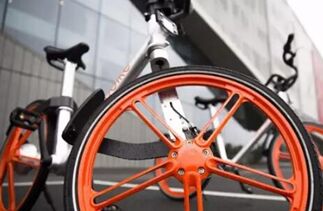亚洲共享单车折戟欧洲市场
|
The notice called it “mass destruction”. After a spate of thefts and vandalism decimated its fleet of bicycles, Hong Kong-based start-up GoBee said last week it would pull out of French cities just days after quitting Italy. But the company’s business update read like an indictment of Europeans: “In four months, 60 per cent of our fleet was destroyed, stolen or privatised, making the whole European project no longer sustainable.” Europe is known as a centre of cycling — home to the Tour de France and the historic birthplace of the bicycle. According to the European Commission, 8 per cent of its population use bikes more than other transport every day and Asia’s largest bike sharing start-ups including Mobike, ofo, oBike and GoBee, have all trained their sights on its cities in search of growth outside their crowded home markets.
Flush with venture capital funding — Ofo has raised at least $1bn — the companies have rolled out in cities including London, Paris, Brussels, Manchester, Munich, Zurich and Madrid. But the launches have been plagued with problems: from logistics and regulation to vandalism, theft — and mass destruction. “Vandalism is one of the main issues operators have,” says Niccolo Panozzo, development officer at the European Cyclists’ Federation. “While all bike-share systems face theft and vandalism, the ease of access to their bikes made it even worse for free-floating services. “There is for sure a cultural component,” he adds. “It is something widespread, yes, but in Europe we have seen a lot of this.” Hong Kong-based GoBee was one of the first Asian companies to try to crack the French market. Its distinctive green bikes, which could be parked anywhere after use, became a common sight on pavements in Paris. However, within a few months of launching, more than 1,000 bikes had been stolen, almost 3,400 damaged across the country and nearly 300 complaints filed with the police. Many of the bikes were simply parked at people’s homes — or “privatised,” in the company’s words. Although some suggested the fate of GoBee underlined a problem with civil society in France — and in particular with its marginalised youth in the suburbs — the company has also exited Italy and Belgium this year. “We were ready for some initial vandalism,” the company said after leaving Italy. “But unfortunately, during the past weeks, the vandalism and attacks towards our fleet have reached limits we can no longer overcome.” The history of bike vandalism is as long as the history of shared bikes. More than 50 years ago, Amsterdam’s Witte Fietsen — or White Bikes service — closed in a matter of days after people either stole the free, unlocked bikes or threw them into canals and rivers. In the decades since, cities and companies have launched restricted versions of this model where riders leave shared bikes in specific places using docking stations. Mobike’s biggest vandals are in Manchester, where bikes have often ended up in bins and in the canal, according to two employees with knowledge of the situation. Docked biking schemes have faced problems too. Santander, which sponsors London’s public bike hire service, was forced temporarily to close a number of docking stations in Milton Keynes after more than half its bikes were damaged or stolen. Bike-sharing companies employ armies of workers to monitor their bikes, which Mr Panozzo estimates can account for up to 30 per cent of costs. These stewards carry bikes to places of high demand, make minor repairs and report incidents of vandalism. “In every single city we have an operations team, we have employees and logistics suppliers to move around the bikes,” says Chris Martin, head of international expansion at Mobike. Joseph Seal-Driver, general manager for the UK and Ireland at ofo, says the company has “an active team of marshals who are employed by ofo on the London living wage”. The bike-sharing start-ups have discovered certain cities are easier to negotiate than others. According to Mr Martin, Milan and Florence have been particularly successful for Mobike, although he declined to outline financial details. And despite the challenges in Manchester, the company has not withdrawn from the city but instead chosen to restrict bikes to the city centre. “The economics and needs of cities are so varied right now,” he said. GoBee’s exit from France will raise concerns for others attempting to launch in Paris. Last month Mobike started a trial in the city, hot on the heels of ofo in December. The city’s own bike-sharing system, Velib, has suffered after a roll-out of new bikes and docking stations was delayed under a new operator. China’s bike-riding sector, which spawned the industry’s global leaders Mobike and ofo, also struggles with vandalism. Wukong Bicycle became one of China’s first bike-sharing start-ups to fold after it announced 90 per cent, or almost 1,100, of its bicycles had been stolen. Those bikes had only been out on the streets of Chongqing, a city in western China, for half a year. Images of “bike graveyards” where local governments deposit unwanted bikes haunt the Chinese start-ups. The companies have turned to technological solutions to limit bad behaviour. All of Mobike’s fleet, and most of ofo’s fleet, is GPS-enabled and communicates with the company’s servers. If bikes are left unlocked or parked in the wrong places, the companies will dock points from that user. Ofo, which is backed by Alibaba, whose payments affiliate Ant Financial provides credit scoring through its Sesame Credit big data platform, has also turned to more comprehensive credit-scoring measures. It requires its worst-scoring offenders to pay a steeper deposit. But according to Mr Panozzo, all these efforts come at a cost. “The commercial sustainability of these systems is not so easy to figure out,” he said. |









